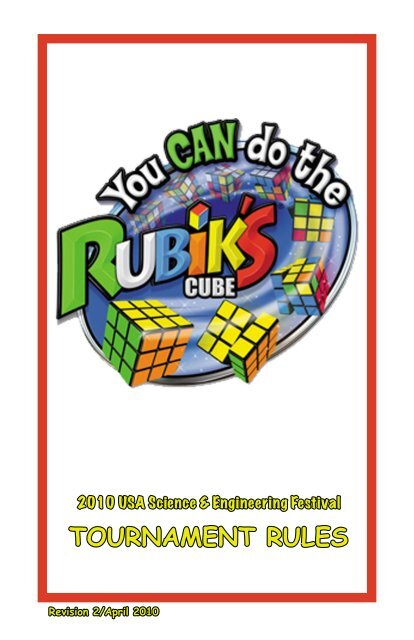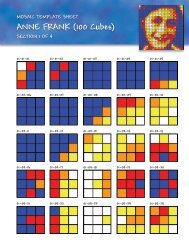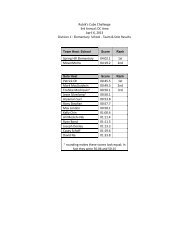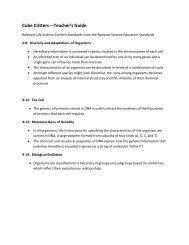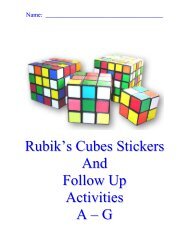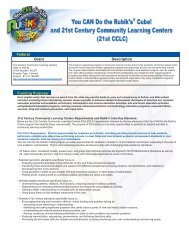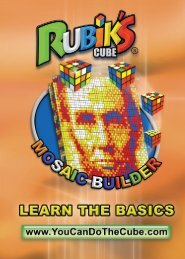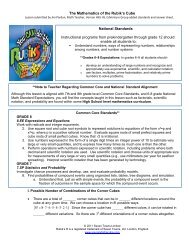TOURNAMENT RULES - You CAN Do the Rubik's Cube!
TOURNAMENT RULES - You CAN Do the Rubik's Cube!
TOURNAMENT RULES - You CAN Do the Rubik's Cube!
Create successful ePaper yourself
Turn your PDF publications into a flip-book with our unique Google optimized e-Paper software.
2010 USA Science & Engineering Festival<br />
<strong>TOURNAMENT</strong> <strong>RULES</strong><br />
Revision 2/April 2010
GETTING STARTED<br />
Competition Date: Saturday, October 23,2010<br />
Preliminary: Thursday, October 21, 2010*<br />
The Tournament will consist of teams of eight, K-12 only, who will be<br />
competing for <strong>the</strong> fastest time to collectively solve 25 <strong>Rubik's</strong> <strong>Cube</strong>s.<br />
Contents:<br />
Section 1 - Eligibility<br />
Section 2 - Registration<br />
Section 3 - Organization<br />
Section 4 - General Rules<br />
Section 5 - <strong>Cube</strong>s<br />
Section 6 - Scrambling<br />
Section 7 - Tournament Procedure<br />
Section 8 - The “Solved” State<br />
Section 9 - Awards & Prizes<br />
* Preliminary Event – will be held on Thursday, October 21, 2010. However,<br />
depending upon <strong>the</strong> number of teams participating, preliminaries may run over<br />
two days beginning Wednesday, October 20, 2010.<br />
1
Section 1<br />
ELIGIBILITY<br />
Eligibility<br />
1. Open to all public, private, religious, home schools, libraries<br />
and o<strong>the</strong>r “Not for Profit” youth organizations with at least 25<br />
students or members that are currently enrolled in school (K-<br />
12) in <strong>the</strong> Greater Washington DC area including Delaware, <strong>the</strong><br />
District of Columbia, Maryland, Virginia and West Virginia.<br />
2. Home schools must be in compliance with <strong>the</strong> home school laws of<br />
<strong>the</strong>ir State to be eligible to participate.<br />
3. Participants must be enrolled in a school in <strong>the</strong> Greater Washington<br />
DC area including Delaware, <strong>the</strong> District of Columbia, Maryland<br />
Virginia and West Virginia at <strong>the</strong> time of <strong>the</strong> tournament (October<br />
2010). Thus all participants will be students.<br />
4. Each entity may enter one (1) team of eight (8) competitors per<br />
Division. (Division 1 will be Grades K-8 and Division 2 is Grades<br />
9-12)<br />
5. Division will be determined by <strong>the</strong> oldest team member on <strong>the</strong><br />
team. e.g. a K-12 school entering one team only, if <strong>the</strong> oldest<br />
member is 12th grade and <strong>the</strong> youngest 1st grade, this team would<br />
compete in Division 2. Alternatively, a K-12 school could enter a<br />
team in each division.<br />
6. A competitor may only be a member of one team.<br />
7. Any questions regarding eligibility should be directed to <strong>the</strong> <strong>You</strong><br />
<strong>CAN</strong> <strong>Do</strong> The Rubik’s <strong>Cube</strong> representative.<br />
2
Section 2<br />
REGISTRATION<br />
Registration:<br />
1. Registration is free. Each entity must complete and submit<br />
a registration form for each team by deadline to be eligible to<br />
participate in Tournament.<br />
2. Registrants must provide all required information.<br />
3. To register an entity must designate a teacher/coach. The<br />
teacher/coach must be over 21 years of age and will be <strong>the</strong> team<br />
contact.<br />
4. At <strong>the</strong> time of Registration it is not required to have <strong>the</strong> team<br />
members identified. However, complete information on <strong>the</strong> team<br />
members will be required no less than 30 days prior to <strong>the</strong> event.<br />
5. Failure to assemble a team by <strong>the</strong> deadline, or failure to attend<br />
<strong>the</strong> Tournament will result in automatic disqualification.<br />
6. All Competing teams must be available for both <strong>the</strong> preliminary<br />
tournament to be held on Thursday, October 21, 2010* at <strong>the</strong><br />
National Electronics Museum and <strong>the</strong> Grand Final on Saturday,<br />
October 23, 2010 on <strong>the</strong> National Mall in Washington DC.<br />
7. The top 6 teams from each division will become finalists and will<br />
advance to <strong>the</strong> Grand Finals.<br />
* Preliminary Event – will be held on Thursday, October 21, 2010. However,<br />
depending upon <strong>the</strong> number of teams participating, preliminaries may run over<br />
two days beginning Wednesday, October 20, 2010.<br />
3
Section 3<br />
ORGANIZATION<br />
Organization Team:<br />
1. <strong>You</strong> <strong>CAN</strong> <strong>Do</strong> The Rubik’s <strong>Cube</strong> representatives will be responsible<br />
for making arrangements before and during <strong>the</strong> tournament and<br />
ensuring that all participants have access to ei<strong>the</strong>r electronic or<br />
printed versions of <strong>the</strong>se regulations.<br />
2. <strong>You</strong> <strong>CAN</strong> <strong>Do</strong> The Rubik’s <strong>Cube</strong> representatives will be responsible<br />
for ensuring that any changes in <strong>the</strong> rules are made available to all<br />
registered competitors.<br />
3. <strong>You</strong> <strong>CAN</strong> <strong>Do</strong> The Rubik’s <strong>Cube</strong> representatives will be responsible<br />
for appointing all Officials for <strong>the</strong> tournament.<br />
4. Teachers, Coaches and Competitors will be required to assist with<br />
Judging, Scrambling and Scoring. Competitors will not judge or<br />
scramble <strong>the</strong>ir own cubes nor record <strong>the</strong>ir own scores.<br />
Officials:<br />
Main Judge:<br />
• Responsible for overseeing <strong>the</strong> entire tournament; making<br />
sure <strong>the</strong> rules are followed, making decisions on penalties and<br />
disqualification, and starting <strong>the</strong> tournament.<br />
Team Judge(s):<br />
• Responsible for executing <strong>the</strong> tournament procedures. These<br />
officials will be a Teacher/Coach from ano<strong>the</strong>r team.<br />
Scramblers:<br />
• Responsible for applying <strong>the</strong> scrambling sequence. These<br />
officials will be Competitors from ano<strong>the</strong>r team.<br />
(Scrambling = mixing up <strong>the</strong> cubes)<br />
Score Takers:<br />
• Responsible for registering <strong>the</strong> results. Team Judges will act<br />
as Score Takers.<br />
Teacher/Coaches:<br />
• Responsible for teaching <strong>the</strong> team to compete and making<br />
sure <strong>the</strong> competitors are aware of <strong>the</strong> rules.<br />
4
Section 4<br />
GENERAL <strong>RULES</strong><br />
GENERAL <strong>RULES</strong>:<br />
1. Competitors must obey venue regulations and conduct <strong>the</strong>mselves<br />
in a manner considerate of o<strong>the</strong>rs at all times during <strong>the</strong><br />
competition.<br />
2. Competitors must remain quiet when inside <strong>the</strong> designated<br />
competition area. Teams are permitted to talk amongst each o<strong>the</strong>r<br />
but any talking must be kept at a reasonable level and must not<br />
disturb o<strong>the</strong>r competitors. Teacher/coaches are not permitted<br />
to assist team, ei<strong>the</strong>r through instruction or by physically solving<br />
<strong>the</strong> cubes.<br />
3. Competitors must be fully dressed. Clo<strong>the</strong>s must not display<br />
vulgar language or have inappropriate pictures.<br />
4. No items whatsoever are allowed on <strong>the</strong> competition table(s)<br />
including cell phones, pagers, or any o<strong>the</strong>r electronic equipment.<br />
5. Use of notes or any form of reference material is not permitted.<br />
6. Competitors may sit or stand during <strong>the</strong> competition round(s).<br />
7. Disqualification: The main judge may disqualify a team and/or<br />
a single competitor or issue a warning for any of <strong>the</strong> following<br />
reasons:<br />
• Competitor is suspected of cheating or defrauding any<br />
officials of <strong>the</strong> competition.<br />
• Competitor behaves in a way that is unlawful, violent or<br />
indecent, or intentionally damages venue facilities or anyone’s<br />
personal property within <strong>the</strong> venue.<br />
• Competitor interferes or becomes a blatant distraction to<br />
o<strong>the</strong>rs during <strong>the</strong> competition.<br />
• Competitor refuses to abide by any of <strong>the</strong> rules as set forth<br />
for <strong>the</strong> competition.<br />
• Disqualification occurs immediately or after warning based on<br />
<strong>the</strong> nature of <strong>the</strong> infraction.<br />
• Any warning will result in a 2 second Competition penalty per<br />
incident.<br />
• In <strong>the</strong> event of any dispute, competitors must accept <strong>the</strong><br />
final ruling of <strong>the</strong> Main Judge.<br />
5
Section 5<br />
CUBES<br />
CUBES:<br />
1. The tournament requires <strong>the</strong> use of 3x3x3 Rubik’s <strong>Cube</strong>.<br />
2. Competitors should bring and use <strong>the</strong>ir own cubes. Competitors<br />
may borrow cubes from o<strong>the</strong>r teams although both must be ready<br />
to compete when called to do so.<br />
3. <strong>Cube</strong>s must be in reasonable working order, so that normal<br />
scrambling is possible.<br />
4. <strong>Cube</strong>s may be made smoo<strong>the</strong>r internally by sanding or using<br />
lubricant.<br />
5. No modifications are allowed that enhance <strong>the</strong> basic concept of<br />
<strong>the</strong> cube.<br />
6. Any modification to a cube that causes poor performance or<br />
results by a competitor are not grounds for additional attempts<br />
in <strong>the</strong> event. Poor performance = pieces popping apart, stickers<br />
falling off, cube rotation sticking, etc.<br />
7. <strong>Cube</strong>s must be clean and must not have any textures, markings,<br />
elevated pieces, damages, or o<strong>the</strong>r differences that distinguish<br />
one cube from a similar cube.<br />
8. <strong>Cube</strong>s must have only one logo and <strong>the</strong> logo must be on one of <strong>the</strong><br />
center-pieces. The cube must show one clearly distinct color per<br />
face in <strong>the</strong> solved state.<br />
9. Competitors are not allowed to bring any cubes into <strong>the</strong> competition<br />
area. Teacher/Coach maintains custody of cubes.<br />
6
Section 6<br />
SCRAMBLING<br />
SCRAMBLING:<br />
1. A Scrambler must apply <strong>the</strong> scramble sequences.<br />
2. Standard metric for scrambling and solving is Quarter Turn<br />
Metric (QTM).<br />
3. The number of moves to scramble a cube (a scramble sequence)<br />
from <strong>the</strong> solved state to scrambled state must be at least 25<br />
moves. A move is one 90˚ turn.<br />
4. <strong>Cube</strong>s must be scrambled with <strong>the</strong> white face on top and green on<br />
<strong>the</strong> front.<br />
5. <strong>Cube</strong>s must be scrambled before each round of a competition.<br />
Definition: Quarter Turn Metric = Where any turn of any face (i.e.<br />
any outer side of cube) by 90˚, clockwise or counterclockwise, counts<br />
as 1 move. A slice (i.e. inner or middle) turn counts as 2 moves for each<br />
90˚ turn.<br />
<strong>TOURNAMENT</strong> LAYOUT<br />
1<br />
2<br />
Scramble<br />
Table 1<br />
3 4<br />
5<br />
6<br />
8<br />
7<br />
1<br />
2<br />
Scramble<br />
Table 2<br />
3 4 5 6<br />
8<br />
7<br />
1<br />
2<br />
Scramble<br />
Table 3<br />
3<br />
4<br />
5<br />
6<br />
7<br />
8<br />
Tea m<br />
Judge<br />
Tea m<br />
Judge<br />
Tea m<br />
Judge<br />
Teacher/C oach<br />
Timer<br />
Teacher/C oach<br />
Timer<br />
Teacher/C oach<br />
Timer<br />
Table 1<br />
Table 2<br />
Table 3<br />
1<br />
5<br />
1<br />
5<br />
1<br />
5<br />
2<br />
6<br />
2<br />
6<br />
2<br />
6<br />
3<br />
7<br />
3<br />
7<br />
3<br />
7<br />
4<br />
8<br />
4<br />
8<br />
4 8<br />
7<br />
A U D I E N C E
Section 7<br />
PROCEDURE<br />
COMPETITION PROCEDURE:<br />
1. Team Judges make sure <strong>the</strong> procedures of <strong>the</strong> competition<br />
are followed. A Judge must call “PENALTY” at <strong>the</strong> time of <strong>the</strong><br />
infraction and such penalty should be noted.<br />
2. Scramblers scramble <strong>the</strong> cube(s) according to Scrambling<br />
procedure on Page 7.<br />
3. Score sheet is completed by Teacher/Coach and timers are tested.<br />
4. Team Judges do a quick cube count and general inspection to ensure<br />
thorough scrambling. If in doubt, scramblers must re-scramble.<br />
5. Main Judge calls teams to “get ready”. All members of <strong>the</strong><br />
competiting team must place <strong>the</strong>ir hands flat on <strong>the</strong> table. Team<br />
must not have any physical contact with <strong>the</strong> cubes until Teacher/<br />
Coach starts timer. Penalty for infraction: 2 seconds.<br />
6. Team Judges cover <strong>the</strong> cubes (use a sheet of paper or a cloth) and<br />
places <strong>the</strong> covered scrambled cubes on competition table.<br />
7. Main Judge inspects all tables to make sure everyone is ready<br />
and when satisfied, tells Teacher/Coach to start <strong>the</strong>ir timer when<br />
<strong>the</strong>y are ready to begin.<br />
8. As soon as <strong>the</strong> Teacher/Coach starts <strong>the</strong> timer, <strong>the</strong> team removes<br />
<strong>the</strong> cover and begins <strong>the</strong> solve. Penalty for infraction: 2 seconds.<br />
Simultaneously, <strong>the</strong> Team Judge should also start <strong>the</strong>ir stopwatch.<br />
9. When a team has solved all cubes and each team member has<br />
released all <strong>the</strong> cube(s) and placed <strong>the</strong>ir hands flat on <strong>the</strong> table,<br />
<strong>the</strong> Teacher/Coach and Team Judge stop <strong>the</strong>ir respective timers.<br />
10. Once <strong>the</strong> time is stopped, competitors must not touch or move <strong>the</strong><br />
cubes or timer until <strong>the</strong> Team Judge has inspected all <strong>the</strong> cubes<br />
and <strong>the</strong> time is recorded toge<strong>the</strong>r with any penalty on <strong>the</strong> score<br />
sheet. Penalty for Infraction: Disqualification.<br />
11. The score time is taken from <strong>the</strong> Teacher/Coach timer. However,<br />
if <strong>the</strong> Teacher/Coach timer has run out (Teacher/Coach Timers<br />
run for a total of 10 minutes), <strong>the</strong>n <strong>the</strong> Team Judge time is used.<br />
Teacher/Coach is responsible for telling Team Judge to stop<br />
timer.<br />
12. The Teacher/Coach initials <strong>the</strong> score and <strong>the</strong> Team Judge takes<br />
<strong>the</strong> score sheet to <strong>the</strong> Main Judge for recording.<br />
13. If <strong>the</strong>re is a dispute, no moves or alignments must be applied to<br />
<strong>the</strong> cube until <strong>the</strong> dispute has been settled, involving <strong>the</strong> main<br />
judge if needed. Penalty for Infraction: Disqualification.<br />
8
Section 8<br />
THE ‘SOLVED’ STATE<br />
SOLVED STATE:<br />
1. Only <strong>the</strong> resting state of <strong>the</strong> cube is considered when <strong>the</strong> timer<br />
has stopped.<br />
2. <strong>Cube</strong>s may be in any orientation at <strong>the</strong> end of <strong>the</strong> solve.<br />
3. All pieces must be fully attached to <strong>the</strong> cube and in <strong>the</strong>ir required<br />
positions.<br />
4. A cube is solved when all <strong>the</strong> face colors are reconstructed and all<br />
<strong>the</strong> parts are aligned within certain limits. A cube is considered<br />
solved if less than a 45˚ move is required. If one move is required<br />
of more than 45˚ <strong>the</strong>re is a 2 second penalty. If more than one<br />
move is required <strong>the</strong> cube is considered not solved.<br />
5. Examples:<br />
Solved - No Penalty<br />
Misalignment requires 1 face<br />
move =45˚<br />
Not Solved<br />
Misalignment requires 1 face and<br />
1 slice move >=45˚<br />
Not Solved<br />
Misalignment requires 2 face<br />
moves >=45˚<br />
Solved = no penalty<br />
All Misalignments
Section 9<br />
AWARDS & PRIZES<br />
AWARDS & PRIZES:<br />
1. Competitors should attend <strong>the</strong> winner’s ceremony to be eligible<br />
for awards and prizes, which will be held within one hour after <strong>the</strong><br />
end of <strong>the</strong> final round.<br />
2. Cash prizes are to be used by winning organization to enhance<br />
Math and/or Science education efforts.<br />
3. The winning team members each receive a trophy and <strong>the</strong> Teacher/<br />
Coach accepts a trophy and prize money on behalf of <strong>the</strong> winning<br />
organization.<br />
4. Winners of awards or prizes should be prepared to talk to<br />
journalists or any media covering <strong>the</strong> competition.<br />
PRIZES:<br />
DIVISION 1- GRADES K-8<br />
1st Prize - $1,000<br />
2nd Prize - $750<br />
3rd Prize - $450<br />
4th Prize - $100<br />
5th Prize- $100<br />
6th Prize- $100<br />
DIVISION 2 - GRADES 9-12<br />
1st Prize - $1,000<br />
2nd Prize - $750<br />
3rd Prize - $450<br />
4th Prize- $100<br />
5th Prize - $100<br />
6th Prize - $100<br />
10
MATH EDUCATION KIT<br />
The <strong>You</strong> <strong>CAN</strong> <strong>Do</strong> The Rubik’s <strong>Cube</strong> provides a Math Education<br />
Kit available at www.<strong>You</strong>Can<strong>Do</strong>The<strong>Cube</strong>.com at a special<br />
discounted price (1 kit - $49.99, 2 - $79.99 and 3 - $99.99) for<br />
Registrants of <strong>the</strong> Tournament. The kit includes 12 Rubik’s <strong>Cube</strong>s,<br />
Solution Guides, and an instructional CD with math lessons and<br />
activities that have been designed and piloted by teachers and<br />
educational consultants for classroom use at varying grade levels.<br />
These lessons are aligned with national standards, curriculum<br />
frameworks in 50 States and 21st Century Skills. Kit materials<br />
can be downloaded (without cubes) for free. Kits can be ordered<br />
online at www.<strong>You</strong>Can<strong>Do</strong>The<strong>Cube</strong>.com using promo code USATEN.<br />
Alternatively, you can download an order form.<br />
www.<strong>You</strong>Can<strong>Do</strong>The<strong>Cube</strong>.com<br />
<strong>You</strong> Can <strong>Do</strong> The Rubik’s <strong>Cube</strong><br />
©2010 Seven Towns Ltd.<br />
RUBIK’S® is a registered trademark of Seven Towns, Ltd., London, England


